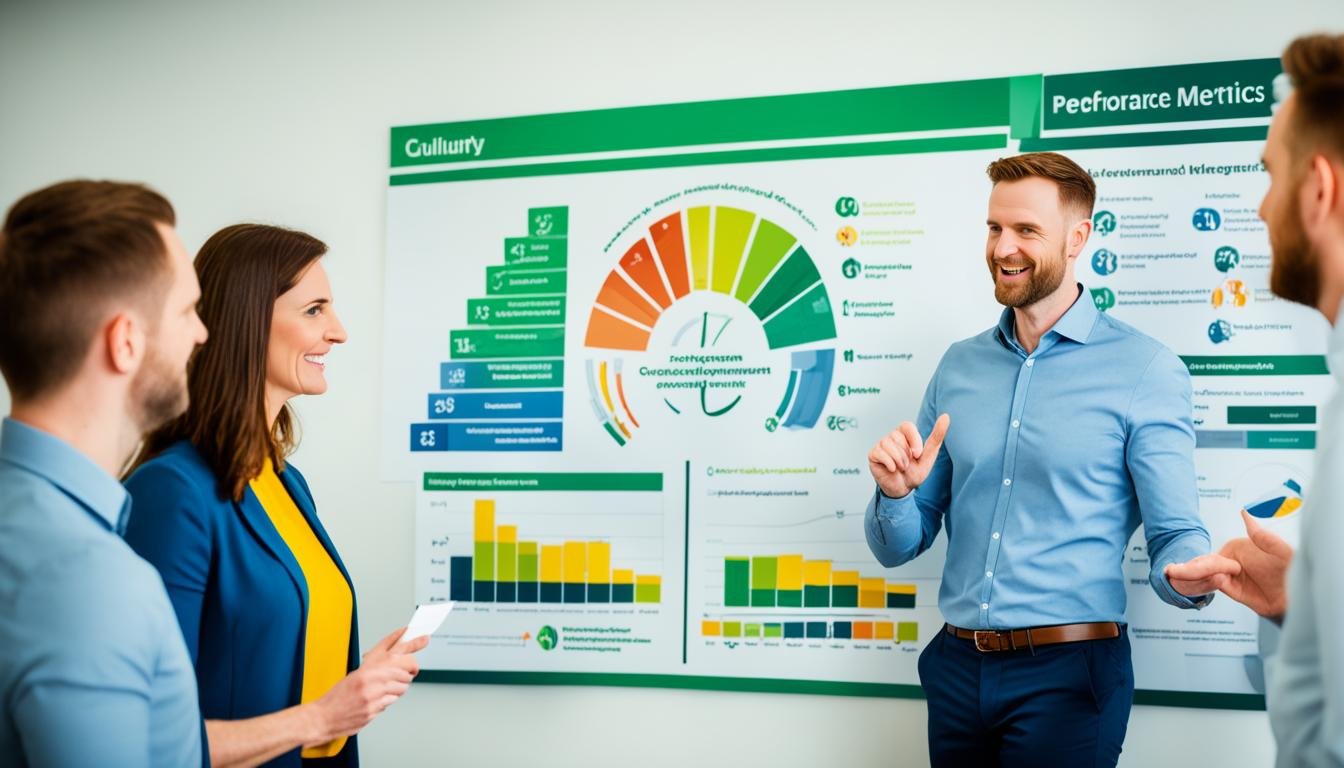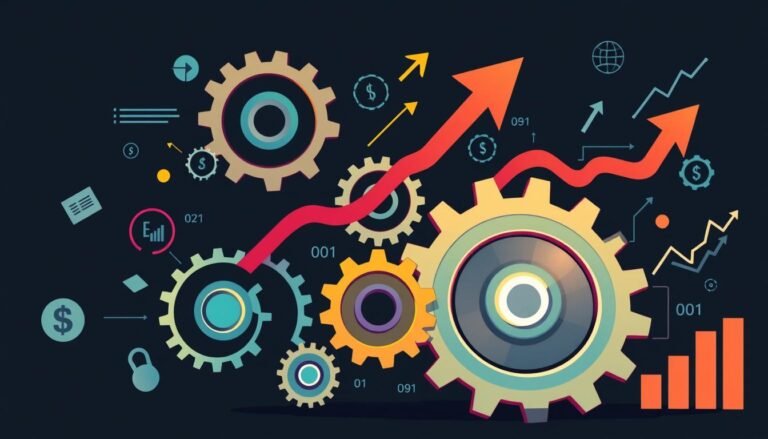What are the top strategies for managing employee performance in Ireland?
Good performance management in Ireland is vital for companies to reach their full potential. It focuses on clear goals and holding each person accountable, aligning their work with the company’s big picture. Since poor performance can be very costly, boosting employee productivity in Ireland is key.
With more people working from home and new health rules because of Covid-19, stress at work has gone up. To help manage this, it’s important to set clear rules on things like time management and using social media. Plus, giving employees a straightforward job description helps them know what’s expected of them.
Add measurable targets and KPIs to the mix, so you can keep track of how well things are going. Take Whirlpool, for example. They boosted their sales by $5.7 million in 90 days using The 4 Disciplines of Execution®. This shows the power of setting clear targets.
But it doesn’t stop there. A continuous performance improvement cycle helps, too. This process includes planning, doing, checking progress, and reviewing. It’s about always trying to get better. Pair this with open talks and helpful feedback, and you have the recipe for a supportive work environment in Ireland. Look at Alamo Community Colleges; they increased degrees and certificates by 17% in 8 months. They did it by setting and exceeding their goals.
Don’t forget about new tools like 360-degree feedback and ongoing support. They offer feedback in real-time and help everyone work towards better results. Take Marriott as an example. Even in tough times, they use strong performance strategies to keep their employees engaged. This shows how important it is to use up-to-date methods in Ireland.
Understanding Effective Employee Performance Management in Ireland
In Ireland, good performance management combines goal setting, regular checks, and proper rewards. It’s all about talking often and giving feedback to build a hardworking team. This method has lately swapped yearly reviews for more frequent and better-quality talks.
Definition and Importance
Performance management is a mix of actions to make sure employees’ work helps meet big goals. By setting clear goals, offering helpful feedback, and using fair evaluation methods, companies can boost performance. The focus is on ongoing improvement, not just yearly checks.
Recent Trends and Shifts
The way Ireland manages performance is changing. People are moving from once-a-year reviews to more dynamic, regular chats. Employers are now valuing helpful talks and coaching over strict ranking. This change highlights the need for continuous feedback and flexible performance systems.
Core Aspects of Performance Management
A key part of managing performance in Ireland is to adapt to each company’s needs. This includes connecting performance goals to what the company wants and what the job needs. It’s key to keep updating goals to meet new priorities and do reviews and tweaks as needed.
Managers play a big role by aligning individual and company goals, giving feedback on time, and ensuring people are responsible.
Employers need to create a culture where performance discussions are seen as integral to personal and organizational growth.
Plus, research shows that the best systems treat individuals and teams fairly in reviews. They help make a teamwork culture. These systems work well because they align with the big goals of the company, making them key to modern workplaces.
Defining and Measuring Performance
In Ireland, performance management helps maintain and improve employees’ performance to meet company goals. It focuses on how well employees do their jobs. It also looks at how they help their company beyond their main tasks, and how they react to changes. Making sure everyone knows and works towards the same goals helps a company work better.
Good performance management means talking often and giving feedback on how things are going. This makes sure everyone’s work lines up with what the company wants to achieve. Take Deloitte, for example. They have 65,000 workers who spend 2 million hours every year on managing their performance.
It’s key to keep looking at and changing your goals based on what the company needs. Performance should be a part of the ongoing process, not just a one-time thing. If Irish businesses set SMART goals and keep checking on them, they’ll do better.
The goals set in Ireland need to matter and not be too focused on numbers. Goals should help everyone be more creative and change quickly when needed. There’s no perfect way to do this. Each company should find what works best for them to meet their strategic goals.
Setting Performance Goals in Ireland
Performance goals are key to success in Irish organizations. They use SMART goals to boost worker motivation and performance. This method helps set clear and achievable targets.
SMART Objectives
Using SMART objectives in Ireland brings big benefits. SMART means Specific, Measurable, Achievable, Relevant, and Time-bound. It’s a tool for setting goals that work.
Thanks to SMART, Irish groups have seen a 25% hike in how much workers engage and produce. These goals don’t just help workers. They also support the organization’s goals.
Organizational vs. Individual Goals
Linking company goals with what each worker aims for is key. It’s important for both to know what success looks like. Having common KPIs helps everyone aim in the same direction.
When companies in Ireland let workers help set their goals, something powerful happens. Engagement skyrockets, making a big difference in how well people work.
Motivating Employees Through Goal Setting
Setting goals can really spur employees in Ireland. When they’re part of the process, they work harder and feel more satisfied. This way, they’ve seen a 30% rise in feeling good about work.
It’s about more than just setting goals once. It’s an ongoing thing that, with the right support, keeps workers happy and doing well in their jobs.
Effective Performance Reviews
In Ireland, the way we evaluate workers is changing a lot. We used to mostly rely on yearly performance checks. But now, Irish companies are having more conversations with employees. They’re doing this throughout the year to help everyone do better through talking about strengths.
Regular vs. Annual Reviews
Remember when reviews happened just once a year? That’s not the case as much now. Companies are stopping just annual checks and starting to do them more often. This regular feedback, usually twice a year, helps keep track of people’s progress and solve problems quickly. It’s all about getting better together and staying on the same page with the company’s goals.
High-Quality Conversations
How well a performance review works often comes down to the talks between managers and their teams. In Ireland, the focus is on having detailed, useful chats rather than basic checks. These conversations are meant to be supportive, giving real feedback, clear goals, and help. They make employees feel valued and help them work better. This way, Ireland is making its workplace culture better, more open, and supportive.
Strengths-Based Approach
Now Ireland is looking at what’s going right instead of just what’s wrong. This means companies are seeing the power in focusing on what employees are good at. By doing this, businesses are creating better working environments. They’re also helping their employees grow to achieve more. The consulting firm McKinsey says this way of managing performance makes companies stronger and more competitive. That’s why this new strategy is important today.
Overall, Ireland’s new approach to reviews through more talks, focusing on strengths, and regular checks is a big change. It’s making workplaces more active and effective.
Motivating Employees in Ireland
Motivating employees in Ireland is key to a successful workplace. Happy employees work harder and come up with new ideas. When people enjoy their jobs, they are less likely to miss work and more likely to stay with the company. This helps the company grow and succeed.
Creating a Positive Work Environment
To make a positive work culture in Ireland, managers should be supportive and encourage open, respectful talk. They should help workers feel their job is secure. Celebrating when a person or a group does well is important. It’s proven to make workers happier in Ireland by 65%.
Incorporating Flexible Work Arrangements
Flexibility at work is very important in Ireland today. It means having options like working from home or choosing your hours. This helps people balance work and life better. It also keeps them more interested in their work. Nexus Human offers a training and management program for this, which has won awards and is highly praised.
These programs provide personal help and ways to grow in your career. A lot of Irish workers say they need this to be happy at work. Offering things like continuous education and training insurance makes people feel the company cares about them. This makes them want to stay and work hard.
Training and Development Opportunities
In Ireland, having lots of training chances is super important. It helps improve how well workers do and keeps them competitive. Just 14% of adults in Ireland took part in learning or training in 2021. This shows the need to get more people involved to keep up in today’s quick-changing world.
Importance of Continuous Learning
Ireland puts great value on continuous learning. This is key to fill the gaps in skills mentioned in the OECD Ireland Skills Strategy Report. The report highlights the need for lifelong learning. This includes learning about thinking, emotions, and technology to do well in jobs that keep changing.
The EU averages just 11% in lifelong learning efforts. Ireland does a bit better. But, it still needs to invest more in lifelong learning.
Leadership and People Management Skills
Improving leadership skills is a big deal in Ireland. Programs like Enterprise Ireland’s Spotlight on Skills help a lot. They make sure leaders have the right skills to lead well.
McKinsey thinks by 2030, 14% of jobs might change because of AI and automation. So, it’s smart to invest in training leaders and managers. This way, companies can be ready for these big changes. They’ll be able to run better and keep their employees happy and growing in their careers.
The Learning & Development Strategy for 2022-2025 is all about specific job training. It includes things like staying within the law, handling things safely, and keeping people and info secure. This strategy helps everyone do better at their jobs. It also makes work more satisfying, keeps service quality high, and helps people grow their careers. In short, it encourages a culture of always learning more.
Employee Engagement Strategies
Building a strong bond among employees is key for Irish businesses. This is crucial for standing out in a tough market. Good employee engagement strategies Ireland boost productivity. They also create a team that is loyal and driven. Studies show, places with engaged staff do 147% better in earnings.
Building a Collaborative Work Culture
For a collaborative workplace culture Ireland, teamwork is vital. It must be more than just a suggestion but part of the work culture. When team members feel valued, they’re over 3 times more likely to be engaged. Engaging in team-building, recognizing hard work, and giving everyone a voice raises engagement.
In Ireland, employees find personal growth very important, with 96% saying it’s key. This means offering chances for learning is critical. It helps teamwork and support within teams grow.
Encouraging Open Communication
Good open communication advocacy Ireland is key to engagement. It’s more than a trendy term; it’s about honest talks and clear feedback. Employees who are fully engaged think their opinions matter greatly. They believe their input can bring real changes.
A workplace with open communication sees a 21% jump in profits. Making roles clear and discussing them often helps employees connect with the company’s goals.
Around 80% of employees say that clear roles and responsibilities boost their engagement.
To sum up, strong employee engagement strategies Ireland, like encouraging teamwork and open communication, are very effective. Irish companies using these methods not only keep their team, but they also draw new, eager talent. Such strategies lead to higher engagement, productivity, and success for the business.
Performance Review Process in Ireland

In Ireland, performance reviews are key for an organization’s growth. They include giving regular feedback, finding strengths and weak spots, and planning how to get better. This helps companies guide their workers well and reach their goals.
Feedback Mechanisms
In Ireland, how companies give feedback is important. Many are moving from yearly reviews to constant feedback. Yet, not many have completely stopped yearly reviews. Good feedback makes a team work better together and helps everyone improve.
Identifying Strengths and Areas for Improvement
It’s crucial in Ireland to know what employees do well and where they can grow. Some companies use a method called 360-degree feedback to get everyone’s view on performance. This approach helps find areas for improvement and highlights what employees are really good at.
Creating Improvement Plans
In Ireland, making plans to improve is getting more and more common. These plans give clear goals for employees to meet. A good plan includes feedback and support like training, and making sure the goals are achievable. It’s also important to check if the time given for improvement is fair and that everyone knows their role very well.
Rewarding High Performers
In Ireland, companies know that rewarding top employees is key to a happy workplace. They use both performance-related incentives and non-monetary recognition to show they value hard work. This helps boost morale and involvement across the workplace.
Performance-Related Pay
High achievers in Ireland get rewarded based on what they’ve accomplished. This can be through bonuses, higher salaries, or getting promoted. Such rewards tie personal success to team goals, leading to better productivity and achievements.
Non-Monetary Rewards
Recognition doesn’t always need to be a cash reward in Ireland. Employees might get thanked publicly, receive awards or extra days off. These gestures value work and boost dedication, without dipping into the company’s funds.
By mixing both monetary and non-monetary rewards, companies in Ireland make sure their top talent knows they are appreciated. This strategy not only lifts spirits individually but also encourages others to strive for success. It creates a culture where excellence is the norm.
Balancing Individual and Team Objectives
In Ireland, achieving the right blend between personal and group goals is key. This mix lets individual efforts and team work come together smoothly. Managers guide this process, making sure personal goals fit with what the team needs.
Importance of Collaboration
Working together is crucial for success at both the individual and team level. To make it work, it’s vital to set clear goals and connect them to rewards. This approach values everyone’s input, which creates a strong, supportive team atmosphere.
Managers in Ireland know the power of a united team. They foster an environment where success is shared. By linking every team member’s role to the big picture, they encourage teamwork towards common goals. Such an approach boosts how well tasks are done and how well team members adapt to change.
By following strategies that focus on working together, both individual and team goals can be reached. Regular reviews, high-quality conversations, and motivational feedback are central in closing the gap between personal dreams and team achievements. This cooperation leads to the organization’s overall triumph.
Adapting to Changes in Performance Management
In recent years, performance management in Ireland has changed a lot. This is to keep up with new ways of working. Employers are looking at old systems and making them more modern. They want to create an environment that’s dynamic and quick to respond.
Embracing Digital Transformation
Digital tools are now central to performance management in Ireland. Organizations use new software and AI. This makes tracking performance and giving feedback easier.
Digital tools bring performance reviews to the next level. They let managers stay in touch with their teams, whether they work in the office or from home.
Adapting to Hybrid Working Patterns
The move to hybrid work has changed how we manage performance. Employees work both in the office and at home. So, keeping in touch is key. It’s important to have flexible policies and to talk about performance often.
This new way of working in Ireland asks for a structured yet flexible system. It needs to meet both personal and company goals. The goal is to improve continuously and solve challenges as they come.
As Ireland organizations change their performance systems, they aim for better practices and discussions. They focus on motivating and engaging workers. These changes are strategic, making performance management an ongoing essential.
Conclusion
Performance management is essential for businesses in Ireland to succeed. It helps build a strong, motivated team. With good communication, regular feedback, and chances to grow, companies in Ireland can see higher productivity.
In Ireland, it’s important to create a work atmosphere that supports employees. Providing rewards and recognition helps keep them engaged. When employees are actively involved, they work better together, come up with new ideas, and enjoy their work more.
Using modern tools and fostering open discussions also pushes businesses forward. It increases their profits and how well they work. By setting clear goals and promoting continuous learning, Irish companies can keep their best people. This way, they thrive over the long term, even as work keeps changing.








